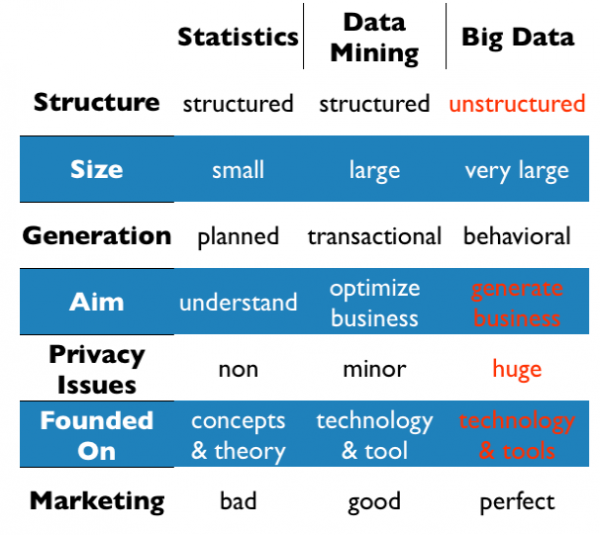One of the most important aspects in the progression of business intelligence is the use of buzzwords. These words drive interest in the field and provide common language between the world of technology and business to steer initiatives. However, in an ever-changing industry it is difficult to pinpoint standard definitions. Buzzwords often overextend their original meanings and often blur lines between other buzzwords. So how do you manage to keep up?
One good way to create some barrier on definitions is to compare several definitions from various experienced professionals. A good of example of this is BI Buzzword Breakdown | 5 Experts Tackle 3 Business Intelligence Definitions by Michael Koploy. An additional approach is to actually compare the application of different buzzwords side-by-side as seen in this graphic from (SOME) TRUTH ABOUT BIG DATA:
The diagram creates context around big data by comparing it directly to statistics and data mining. In this case, the definition of big data is not only derived from what it is, but also from what it is not.
Keeping in mind these points, here are my perspectives for each of the three buzzwords from the article mentioned above:
Big Data
This seems to be the hottest buzzword of the three. In a simple definition, data becomes ‘Big’ when it is no longer manageable using basic database and reporting solutions. But why would you want unmanageable data? In this case, the limitations actually become an opportunity. You can’t place this data into an excel file, there are too many data points for simple charting and you can’t simply look at aggregates for any real insight. By not being able to use these basic approaches you are forced to look at the data from a more holistic perspective. As a result is the business must apply broader analytics, statistics and data mining techniques that let the data drive the correlations and resulting insight. With such expansive, unstructured data sets the approaches used in understanding the data becomes closer to biology than business.
Data Warehousing
When this buzzword comes into play, it is typically driven by a goal to provide better data organization and possibly achieve the traditional data warehousing mantra: ‘one version of the truth’. This can also be referring to the Enterprise Data Warehouse which is more specifically a data warehouse that integrates data from all aspects of the business. By integrating this data into a common structure, you are able to compare the data in from different ends of the business. An example would be calling on an individual from the finance team and an individual from the marketing team to pull up identical perspectives of marketing budget data from their own separate reporting interfaces and come back with the same numbers. Once data warehousing is in place it opens the door to new buzzwords, such as data quality management (DQM) and master data management (MDM).
Data Mining
If capturing big data is what opens the door to deeper analytics, data mining is actually walking through it. Data mining has its historical roots in statistics, but it is different in that it is using larger amounts of structured data. Similar to big data, the approach is to discover correlations within the data. In contrast to big data, the structured data used with data mining allows for a well-defined and straight-forward analysis. As a buzzword data mining seems to have a larger stretch of use in business which is likely due to word combination itself. While big data and data warehouse are fair descriptions, the idea of “mining data” seems to conjure up a world of possibilities in how it’s done. (The same can be said for Data Scientist and the broadness in which people use that buzzword) Businesses that are involved in data mining with big data may also implement other buzzwords such as predictive analytics and/or text mining with the additional presence of unstructured data.
It can be argued that buzzword definitions are stretched and abused in all industries. Over time they may even grow into an umbrella terms, corralling a new wave of buzzwords. (See 1958 definition of business intelligence and its changes through the years) Despite the confusion buzzwords may cause, they really do serve as the common ground for the divided worlds of keep it simple business and jargon happy technology.
What do you think about buzzwords? How about the ones listed above?

